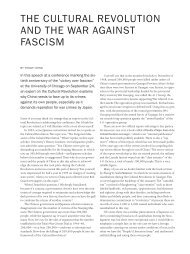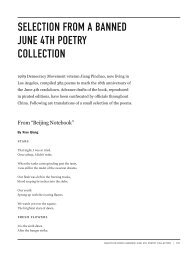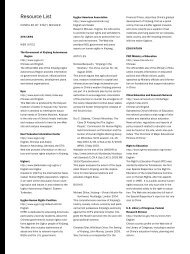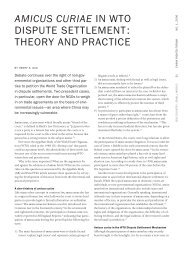STATE SECRETS: CHINA'S LEGAL LABYRINTH - HRIC
STATE SECRETS: CHINA'S LEGAL LABYRINTH - HRIC
STATE SECRETS: CHINA'S LEGAL LABYRINTH - HRIC
Create successful ePaper yourself
Turn your PDF publications into a flip-book with our unique Google optimized e-Paper software.
4 HUMAN RIGHTS IN CHINA <strong>STATE</strong> <strong>SECRETS</strong>: CHINA’S <strong>LEGAL</strong> <strong>LABYRINTH</strong><br />
Section I, Part C describes and assesses some government reform efforts, including<br />
the Open Government Information (OGI) effort started in 2002. This OGI<br />
effort continues to develop, and reflects some desire to make government information<br />
available. However, greater superficial openness does not necessarily mean<br />
that the government is adopting the oversight, monitoring, and accountability<br />
mechanisms necessary to implement these initiatives in a way that are not constrained<br />
by the overriding imperative to maintain political power at all costs. The<br />
state secrets system itself undermines these reform efforts.<br />
Section I, Part D presents <strong>HRIC</strong>’s recommendations for reforms of the state<br />
secrets system to better protect the rights to freedom of expression and<br />
information. Governments have an obligation under international law and norms<br />
to facilitate transparency and access to information. Without access to information,<br />
other rights are easily infringed, including the right to education, health and<br />
criminal procedural protections. Without a transparent and accountable legal system,<br />
the PRC has a rule by law, not a rule of law. While recognizing the limits of any<br />
legislative reforms in the absence of political reforms, <strong>HRIC</strong> presents recommendations<br />
for substantive revisions, as well as suggestions for more accessible and<br />
clear legislation that defines the relationship it has to the implementing bodies—<br />
the public security apparatus, administrative agencies and the courts. <strong>HRIC</strong> also<br />
presents recommendations aimed at promoting the PRC’s compliance with and<br />
implementation of its international human rights obligations.<br />
Section II presents state secrets laws, regulations and implementation<br />
measures, as well as other relevant provisions of the state security law,<br />
criminal law and criminal procedure law. These documents are presented both in<br />
Chinese and in English translation. With this report, <strong>HRIC</strong> is providing in English,<br />
for the first time, an extensive collection of the documents and regulations that<br />
help to describe and define the PRC state secrets system. A fundamental principal<br />
of rule of law is that law must be promulgated and accessible. In preparing this<br />
report, sustained effort has been made to identify law as currently effective and<br />
amended, but a fundamental flaw in the PRC state secrets framework is the<br />
absence of coherent systems permitting timely access to governing law. 4<br />
As examples of the impact of the state secrets system on individuals, on the whole<br />
society, and on the legal system, we also present, in the Appendices, information<br />
on individual state secret cases and information on governmental cover-ups. A rare<br />
selection of official charts and documents related to the state secrets system are<br />
also included in the Appendices. Taken as a whole, this report provides a useful and<br />
constructive resource for advancing greater transparency, accountability, and protection<br />
for human rights in the PRC.







